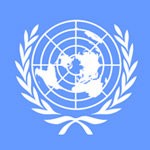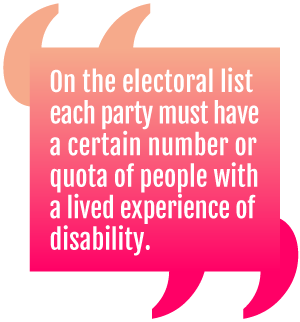Being goes to the United Nations

Our Collective Purpose partner, Being – the independent, state-wide peak organisation for people with a lived experience of mental illness, recently went to New York to attend the 10th session of the Conference of State Parties to the Convention on the Rights of Persons with Disabilities.
The convention is a United Nations rule which sets out a number of human rights that people with a disability should have. It goes into detail about what governments around the world can do to ensure people with a disability have equal rights.
 Being Policy Officer, Kirsten Gibbs, travelled to New Yorkin June for the conference and recently sat down with Mental Health Matters to discuss the highlights of her time spent at the United Nations. Kirsten started by explaining why the convention matters.
Being Policy Officer, Kirsten Gibbs, travelled to New Yorkin June for the conference and recently sat down with Mental Health Matters to discuss the highlights of her time spent at the United Nations. Kirsten started by explaining why the convention matters.
“It matters because we know that people who have psychosocial and other disabilities face more barriers accessing everyday things like housing, employment and general community participation. The convention makes governments responsible to ensure they don’t leave any of their citizens with a disability behind,” said Kirsten.
Governments who sign up to the convention have to go back to their country and implement them. Australia is a signatory to the convention and has ratified it in parliament which means that Australia now legally has to achieve the benchmarks set out in the convention. It also means that Australia gets audited by United Nations observers every few years to make sure that Australians living with a disability have their human rights protected.
Being was able to attend the conference through travel grants provided by the Department of Social Services and the Australian Human Rights Commission which actively support NGOs and bodies who represent people living with disabilities to attend these conferences.
 “The conference is like a melting pot for people who have a vested interested in the topic to come together to discuss the convention, provided updates about what is happening in each country and discuss what needs to improve in the future,” said Kirsten.
“The conference is like a melting pot for people who have a vested interested in the topic to come together to discuss the convention, provided updates about what is happening in each country and discuss what needs to improve in the future,” said Kirsten.
One of the more memorable sessions for Kirsten was a panel session discussing Article 12 of the convention, which describes the right to legal autonomy for people with a disability.
“This is having a huge impact worldwide because every country who has signed on has to change their laws regarding their mental health act and guardian laws, so that they give people with disabilities legal capacity. The panel was really interesting because there was a
whole heap of countries discussing how they are going implementing the new laws.
“In Australia, Being has been working with the Australian Government who is looking into changing Australian law to meet the requirements of the convention,” said Kirsten.
Another interesting session discussed people with a disability in political and public life. An Egyptian parliamentarian explained how through their parliamentary system of proportional representation and the use of a list system, it ensured people with a lived experience of disability were included in parliament.
“On the electoral list each party must have a certain number or quota of people with a lived experience of disability. In turn this means that parliament has to have diversity and people with a disability.
“They explained that they are trying very hard, that while these people are in parliament they are known for more than just being that MP with a disability, that they can in fact work in other areas of government not just disability. They are making sure that parliamentarians with a lived experience are on all the committees not just the ones relating to health and disability,” said Kirsten.
So how does Australia stack up? Kirsten says that from an international perspective there are good things that Australia is doing when compared to other countries.
 “There still remain countries where people are completely institutionalised. There is one country where parents leave their child with a disability [at an institution] to be taken care of, and in the institution there is a graveyard, so people literally spend their entire life in the one place, so obviously that country is not doing as well as Australia.
“There still remain countries where people are completely institutionalised. There is one country where parents leave their child with a disability [at an institution] to be taken care of, and in the institution there is a graveyard, so people literally spend their entire life in the one place, so obviously that country is not doing as well as Australia.
“One of the strengths of the Australian model, [which was made] particularly [clear] at the conference, is how closely the Australian government works with civil society and the NGO community, who don’t all share the same views about how Australia is doing regarding human rights for people with a disability, but who do share a vision to work together to better the lives of people with a disability. There are some countries where they don’t work together at all, and generally it’s those countries which Australia is outperforming,” said Kirsten.
Law reform for guardianship and also work into the use of seclusion and restraint in mental health facilities are key areas within mental health where Australia is taking a leadership role.
One thing that was raised on the floor of the conference by the Australian civil delegation was that the Australian Government will not support a royal commission into claims of abuse at institutionalised care facilities, which is something civil society believes needs to happen.
Since coming back from the conference Kirsten believes that Being is in a very strong position now because of all the connections made on a civil and government level.
By Benjamin Graham
Newsletter
Stay up to date
Sign up to our Mind Reader newsletter for monthly mental health news, information and updates.